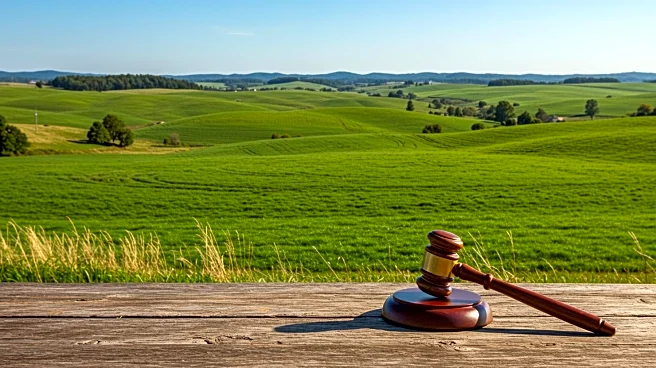What's Happening?
More than 2,600 acres of Iowa farmland are scheduled to be auctioned in August 2025, according to Successful Farming. The auction will include various tracts across 14 counties, with Hamilton County offering nine tracts totaling 614.85 acres. Peoples Co. will manage the sale for the Reveiz family, with bidding open online. Land Agent John Reburn anticipates diverse interest from farmers, hunters, and potential homeowners. Tracts 2, 8, and 9 are expected to attract farmers due to their cropland and proximity to the Boone River. Butler County will auction four tracts totaling 421.13 acres, managed by High Point Land Company for the Duane Bauman and Georgette Bauman Trusts. The auction is expected to be competitive, with interest from local operators and investors.
Why It's Important?
The auction represents a significant opportunity for farmers and investors to acquire productive farmland in Iowa, a state known for its agricultural output. The sale could impact local farming operations, offering a chance to expand acreage and improve efficiency. The competitive nature of the auction highlights the demand for quality farmland, which could drive up prices and influence land values in the region. The inclusion of CRP income and potential wind turbine income in some tracts adds financial incentives for buyers, potentially affecting land use and conservation efforts.
What's Next?
The auction is expected to draw significant interest, with strong bidding anticipated for each tract. Buyers will have the option to continue existing CRP contracts or convert land back to row crop production, impacting future land use. The outcome of the auction could influence local land markets and set precedents for future sales. Operators and investors will likely assess the potential for long-term returns and strategic expansion opportunities.
Beyond the Headlines
The auction could have broader implications for rural communities, affecting local economies and land conservation efforts. The sale of large contiguous tracts may alter land ownership patterns, impacting community dynamics and agricultural practices. The competitive bidding process underscores the importance of farmland as a valuable asset, with potential shifts in land management and environmental stewardship.










